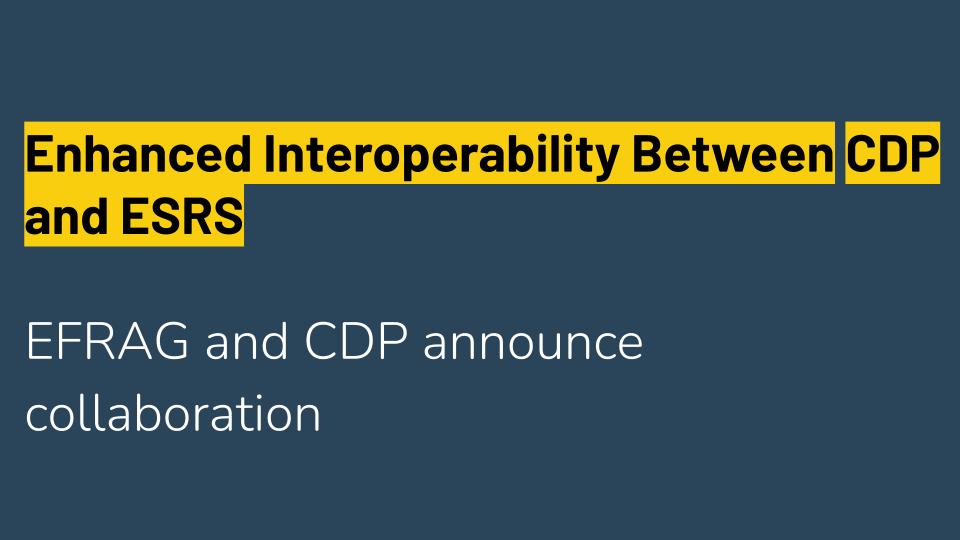Introduction
Multiple sustainability reporting frameworks create inefficiencies, duplicative efforts, and inconsistencies for companies. CDP is a widely used voluntary reporting framework that companies leverage to share environmental information with stakeholders, including investors, employees, and customers. Reporting is conducted annually, with the portal opening each April and submissions due by July. With the implementation of the European Sustainability Reporting Standards (ESRS), there are areas of overlap between these two standards.

Interoperability between CDP and ESRS
Earlier this week, the European Financial Reporting Advisory Group (EFRAG) which drafts the ESRS and the Carbon Disclosure Project (CDP) announced an important step toward simplifying sustainability reporting in Europe. This collaboration focuses on aligning CDP’s questionnaire with the EU’s Corporate Sustainability Reporting Directive (CSRD), allowing companies to address reporting requirements under both CDP and European Sustainability Reporting Standards (ESRS) through a single streamlined process. Specifically, the alignment covers ESRS E1—the standard for climate change—providing companies with an efficient way to report on climate-related information that meets multiple regulatory and stakeholder expectations.
This initiative reflects the trend we explored in our earlier blog post on the interoperability of ESRS, GRI, TCFD, and IFRS (available here). As discussed, there’s a global trend toward harmonizing reporting frameworks, helping companies manage compliance across jurisdictions more effectively. The alignment between EFRAG’s ESRS E1 standard and CDP’s questionnaire underscores this trend, reducing the reporting burden and addressing the overlaps between disclosure requirements.
EFRAG and CDP’s interoperability initiative specifically facilitates disclosures on climate change, biodiversity, and water security. By enabling companies to meet ESRS E1 requirements through the CDP questionnaire, the collaboration enhances data consistency across platforms and meets the needs of both investors and regulatory bodies. This step is part of a broader convergence in sustainability standards, responding to demands from businesses and investors for reliable, streamlined, and comparable sustainability data.
Got questions about ESG or sustainability?
Book a free and nonbinding discovery call to discuss your questions with one of our sustainability experts, and learn how we can help you.
Conclusion
As we highlighted previously, alignment among frameworks like ESRS, GRI, TCFD and CDP promotes transparency, accountability, and a clearer corporate sustainability narrative. This collaboration contributes significantly to Europe’s sustainable future by supporting a cohesive approach to sustainability reporting.
Read the news release here.
About NordESG
NordESG is an advisory firm helping corporates develop, articulate and execute their ESG and sustainability strategies. Our work includes sustainability performance reporting support under various ESG frameworks, strategy development or conducting materiality assessments. By doing so, we help businesses meet their disclosure compliance requirements like CSRD but also help them proactively communicate their strategy to other stakeholders like investors, customers and local communities in which they operate. Our work is focused mainly on Europe and North America.
Discovery Call
Book a free discovery call below
Get in touch via email
Disclaimer
This communication is marketing material. The views and opinions contained herein are those of the author(s) on this page, and may not necessarily represent the views expressed or reflected in other NordESG communications or strategies.
This material is intended to be for information purposes only. It is not intended to provide and should not be relied on for accounting, legal or tax advice, or investment recommendations. Reliance should not be placed on the views and information in this document when taking individual investment and/or strategic decisions. Information herein is believed to be reliable, but NordESG does not warrant its completeness or accuracy.
Some information quoted was obtained from external sources NordESG consider to be reliable. No responsibility can be accepted for errors of fact obtained from third parties, and data and information contained in this communication may change in the future. The views and opinions expressed in this communication may change.